
views
 What is more surprising than the silent and continuing rise of the BJP as an independent political force in Kashmir are the stories of its members. What made a local Kashmiri salute the Tricolour hoisted by Murli Manohar Joshi at Lal Chowk in 1992, rub shoulders with a little-known RSS pracharak who would later go on to become the Prime Minister? What drove a policeman, during the peak of militancy in 1990s in Kashmir to leave his job and join the most hated political party in Kashmir, the BJP, at the risk of losing his life? Why, after repeated attempts on his life, one of which nearly killed him, has a Kashmiri Muslim continued proclaiming his devotion to the BJP?
What is more surprising than the silent and continuing rise of the BJP as an independent political force in Kashmir are the stories of its members. What made a local Kashmiri salute the Tricolour hoisted by Murli Manohar Joshi at Lal Chowk in 1992, rub shoulders with a little-known RSS pracharak who would later go on to become the Prime Minister? What drove a policeman, during the peak of militancy in 1990s in Kashmir to leave his job and join the most hated political party in Kashmir, the BJP, at the risk of losing his life? Why, after repeated attempts on his life, one of which nearly killed him, has a Kashmiri Muslim continued proclaiming his devotion to the BJP?
In this issue of our multi-part series on the rise of BJP in the Valley, we profile six BJP members to understand why and how they’re driving up what still remains quite an unpopular name in Kashmir.
Ashraf Aazad
This happened in 1992. Kashmir was in the grip of a full-fledged, Pakistan-backed militancy when Murli Manohar Joshi announced his decision to hoist the Tricolour at Srinagar’s historic square, the Lal Chowk, on Republic Day.
The militants were infuriated. They threatened Joshi and BJP supporters, and dared them to hoist the flag on the iconic clock tower.
They had managed to carry out a huge strike two days before January 26. The militants had snuck in a bomb in the meeting room of the state DGP. The bomb went off while a meeting was in progress and top police officials, including the DGP, sustained critical injuries.
On January 26, Lal Chowk was surrounded by hundreds of security men and curfew was imposed in Kashmir. Joshi did raise the flag on the pedestal of the clock tower, though he sustained injuries when the staff supporting the Tricolour snapped.
Apart from the by-and-large Hindu supporters of the BJP, at some distance was a Kashmiri local, in his early 20s, Mohammad Ashraf Aazad, who had taken great risks to reach Lal Chowk from his village, Hakarmulla in Budgam. He, too, stood still, saluting the flag.
“There was a curfew and I had to lie to the forces about going to hospital,” says Ashraf, adding that his reason to reach Lal Chowk was to see and admire “the man who had challenged the might of militants”.
When he saw Joshi unfurling the flag and others saluting it, he too saluted, says Aazad. “It was out of respect for their dedication.”
Then, he recalls, his arm was gripped by somebody. “I saw a man with the black beard on his face, wearing black waistcoat over white kurta, asking me my name. I was frightened but told him.”
Aazad says the person took him along in a vehicle to a place which he later found out was Srinagar’s Nehru Guest house.
“That man, I later got to know, was a member of the RSS and his name was Narendra Damodardas Modi,” recalls Aazad.
Those who had come along with Joshi were impressed after interacting with Aazad. He was taken to Jammu where he was asked to form a peace group. His work was to make people understand that gun is not the solution.
“When I returned to Srinagar, I got security and government accommodation,” he says. According to Aazad, he was running a small LPG -filling unit in Bemina locality of Srinagar. However, a local from his village said he was already considered a renegade.
The next year when Narendra Modi visited Kashmir, Aazad was asked to stay with him. “Kashmir had only six districts at the time. Modi ji and I visited almost all districts,” he claims. “We met a number of people.”
During this time, he says, Modi stayed at his home for three days. “He would only eat vegetarian food,” recalls Aazad.
Later in 1996, Aazad was given a ticket by the BJP to fight the Assembly elections from Budgam. “The situation was tense. It was so bad that even I couldn’t go to the booth to cast my vote,” he says. Aazad didn’t win, but got 2,750 votes.
His house was burned down by unidentified people in 1998. During this time, he also survived many militant attacks.
In 1998, the BJP came to the power at the Centre and Modi was appointed party in-charge for Jammu and Kashmir. The bond between Aazad and Modi grew stronger. In 1999, during the Kargil War, Azad led a rally of BJP workers from Srinagar to Kargil on the request of Modi.
“Everyone is going to Kargil by air, but I want you to go by road,” Aazad recalls Modi telling him. “I went with some other workers and met locals and the Army.”
Aazad says he was close to Modi even while the latter was Gujarat CM. “I was in contact with his office and would talk to him whenever I felt necessary,” says Aazad, adding that whatever Modi is doing is “best for Kashmir”.
Aazad doesn’t have any picture of Modi and him together. “I don’t keep even the party card with me. Kashmir is a dangerous place,” he says with a chuckle.
He has fought three unsuccessful elections from Budgam. In 2014, he opted out of polls. “I am not that active now. I am a father of four children — two sons and two daughters. I have to arrange their marriages someday and look after my family,” he says.
“Well, I will remain a BJP man throughout my life,” says Aazad, now in his 50s, with a long white beard, skull cap and a proud smile.
Sofi Yousuf
Soon after joining the college in Anantnag, Sofi Yousuf was selected as a constable in Jammu and Kashmir Police. But he always harboured political ambitions.
During his service, he began approaching the leaders of the BJP in Jammu to get membership of the party. This was 1996 when thousands of young men of Yousuf’s age were picking up arms to become militants.
Yousuf says that the rigged polls of 1987 gave birth to militancy in Kashmir and the problems were compounded when government-sponsored militia, the Ikhwanis, began committing atrocities. “Behind all of this was the Congress and this became the reason for me to join the BJP,” says Yousuf.
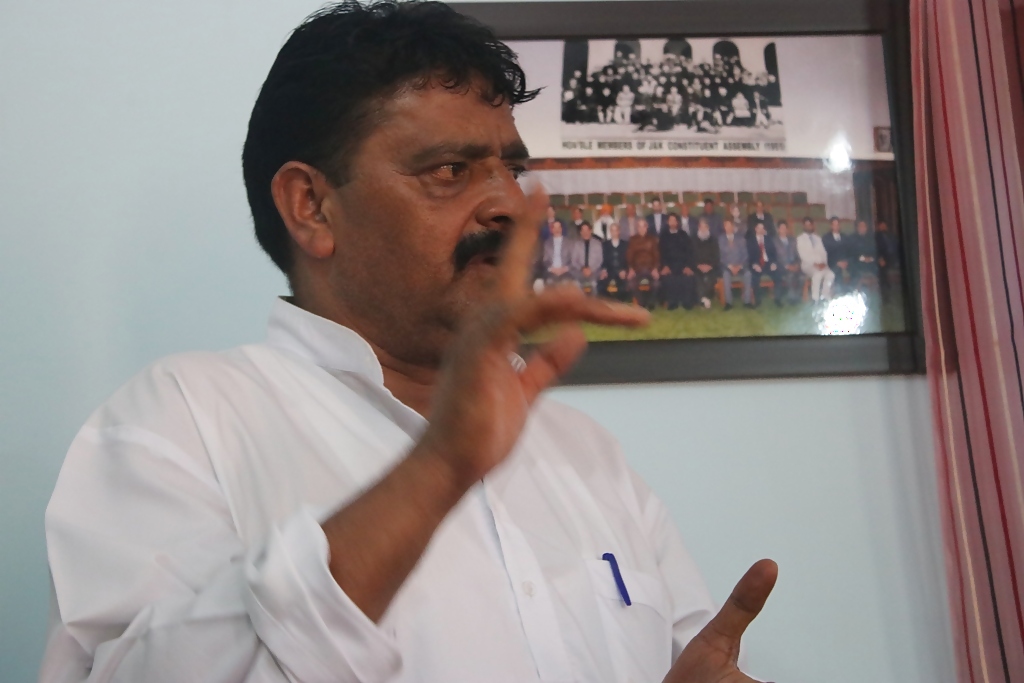
Sofi Yousuf became the first BJP legislator from Kashmir when the PDP-BJP government came to power in 2015. (Photo by Abu Bakar)
In 1999, Mehbooba Mufti, who was then a Congress MLA resigned when her father launched the Peoples Democratic Party (PDP). After the seat fell vacant, bypolls were held. The BJP nominated Sofi Yousuf as its candidate from Bijbehara constituency. He lost, bagging only 550 votes. But his journey, though perilous, of mainstreaming the BJP’s political ideology in Kashmir had begun.
During 1999 parliamentary elections, Yousuf was campaigning with Hyder Noorani, the BJP’s candidate from Anantnag constituency. When their cavalcade reached Thajiwara, a village in Bijbehara town of south Kashmir, an improvised explosive device (IED) went off. “Our cars were blown up. Hyder Noorani and three of our local workers died on the spot,” he recalls. “I was lying in a pool of blood. Militants from a nearby hillock were firing at us.”
Yousuf was rushed to hospital where he struggled with critical injuries for six months. But that couldn’t curb his enthusiasm. Having won his party’s trust by working in quite adverse circumstances, Yousuf was in 2002 appointed as BJP’s Kashmir president.
He contested Assembly elections in 2002, 2008 and 2014, and Lok Sabha polls in 2004, 2009 and 2014 on BJP tickets, but never won.
When the PDP-BJP government came to power in 2015, Yousuf was elected to the Upper house of J&K Legislative Assembly, becoming the first BJP legislator from Kashmir.
At 52, Yousuf says he never thought he would become a legislator.
“After joining the BJP, I met the top leaders of the party, including Atal Bihari Vajpayee and LK Advani. Whenever they visited Kashmir, I used to accompany them,” says Yousuf. “In 2002, I organised a mega rally for the party when Vajpayee ji and Venkaiah Naidu visited the Valley,” he recalls.
Sitting in the wood-panelled party office in Anantnag, surrounded by the portraits of party leaders and party flags, Yousuf says he was approached by the Congress, National Conference and the PDP, but he turned all of them down.
“I joined the BJP when we had few MPs in Parliament. I am in the party out of conviction because the party doesn’t have double standards,” he says.
Yousuf is one of the old hands of the BJP in Kashmir, who thinks “development is the solution” to the Kashmir problem.
Lateef Ahmad Khan
A photojournalist by profession, Lateef Ahmad Khan was associated with the Congress before joining the BJP in 2000. Khan, 40, hails from Srigufwara, Pahalgam. He says he joined the BJP only after examining the work done by the party.
“People say this party is anti-Muslim. When I joined the party, I had this thing in mind, but after meeting senior party leaders and attending party meetings, I found that no anti-Muslim agenda was ever discussed,” says Khan.
He says that joining other parties could have been easy and beneficial for him, but looking at their “hypocrisy”, he finds the BJP to be “the best option” available. The aversion to family rule in the party also impressed him, Khan says.
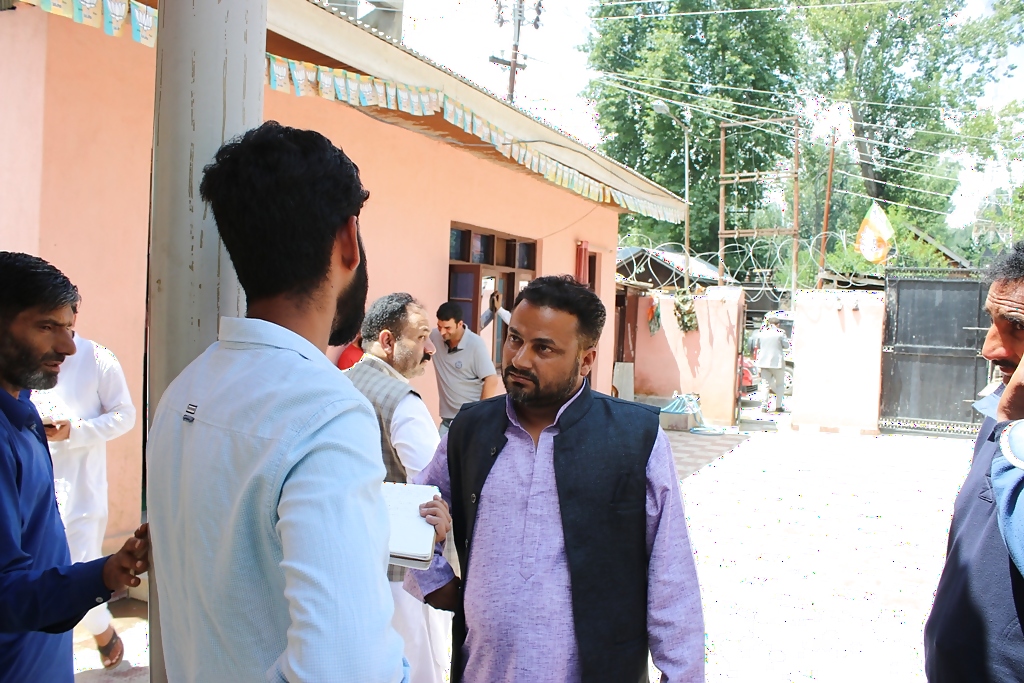
Lateef Ahmad Khan jumped ship from the Congress to the BJP in 2000. (Photo by Abu Bakar)
“If one works with dedication, the party will not overlook that person. But in other parties, family’s writ runs large,” says Khan, citing the Congress, PDP and National Conference.
Khan, too, has survived many attacks. He has received threat letters as well.
Recently, Khan says, a petrol bomb was hurled at his house while he was attending a party meeting in New Delhi. “It was a narrow escape for my family. A portion of my house was gutted,” says Khan.
But despite the ups and downs, Khan has stayed a loyal worker of the party in Kashmir for the last 17 years. “People say your party can never win in Kashmir. But I am sure we will win. They used to say we can never form the government, but we did,” Khan tells News18 in Anantnag party office.
A proud BJP member, Khan says he is willing to “die for the party”.
Altaf Thakur
A post-graduate in Political Science, Altaf Takur, a tall and broad-shouldered man, is BJP’s Kashmir spokesperson. He has been the party’s media in-charge for the last seven years. His journey with the BJP started in his university days.
“I joined the BJP in 2002 when I was pursuing my post-graduation,” says Takur. “I was promoting patriotic politics in the university campus. I was sort of an undercover operative of the party.”
But having ‘blown his cover’, so to speak, he was attacked during university days, almost killed.
“I was abducted by militants when I was coming out of university campus. They took me to a nearby apple orchard and started beating me, but I somehow managed to flee after beating one of them with a wooden log,” says Takur.
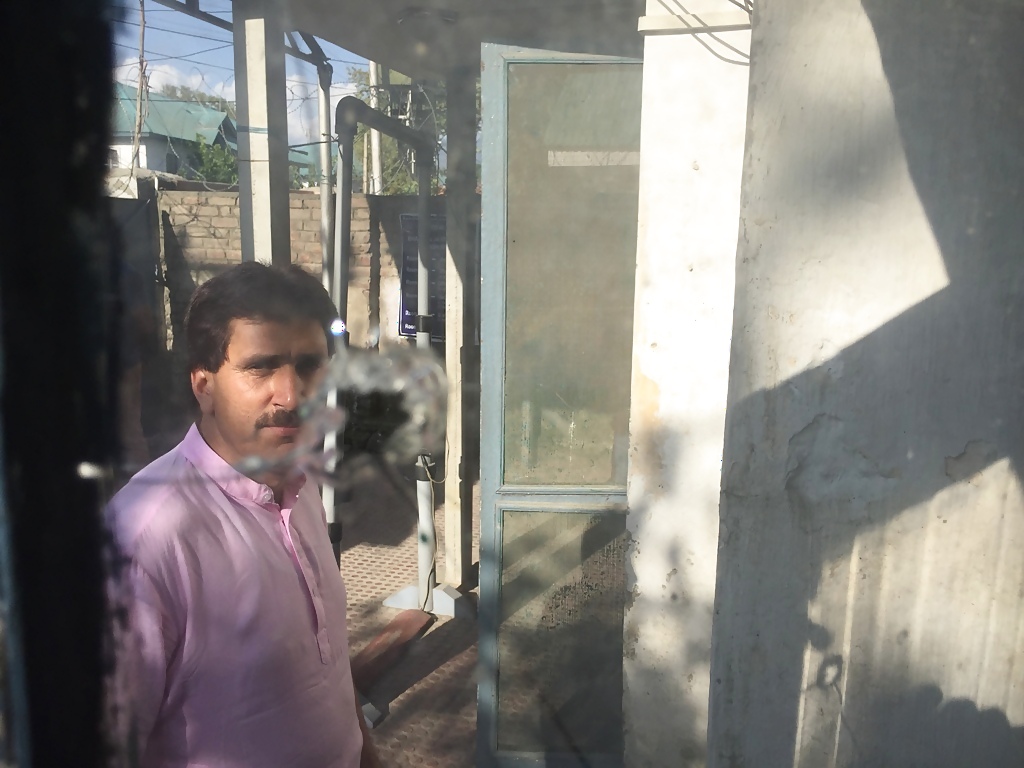
Altaf Thakur hails from Darsara area of Tral, a militant hotbed, and has not been home for eight years. (Photo by Abu Bakar)
He says that through the years, he has survived three militant attacks but never thought of quitting the party.
Takur hails from Darsara area of Tral, a militant hotbed. Militant commander Burhan Wani hailed from the same place.
Takur says that he has not visited his home in eight years due to the security threat in Tral. “I got to meet my mother after four years and when my father died in September 2016, I couldn’t attend his funeral due to party work,” he says.
But Takur says he is a proud man and a proud Indian. “Being a BJP activist in Kashmir is not an easy task. I have seen worst of the times. But I know I am right,” he says.
He stands with the party on the principles that Article 370 and 35A are “discriminatory” and should be “removed.” “Kashmir’s status should be at par with other states of India. Only then can we have peace,” he says, adding that only a BJP government is capable of doing it.
When asked about the BJP being seen as the facilitator of growing attacks against Muslims and other minorities in India, Takur says, “It is the hypocrisy of the Opposition. People accuse Narendra Modi of being anti-Muslim, but I have seen in Gujarat how empowered and happy the Muslims are,” he says.
Neelam Gash
An engineering graduate, 33-year-old Neelam Gash, was never interested in her field. She started running an NGO before going for Masters of Computer Application in Delhi. Later, she joined a company as the Relationship Manager in New Delhi and worked there for four years.
Gash lived in Iran for nearly a decade with her family and father, working as a doctor. She then quit her job, returned to India and began preparing for civil service exams, but couldn’t make the cut. Before she dabbled in active politics, she was appointed by the Congress for a program aimed at finding young leaders.
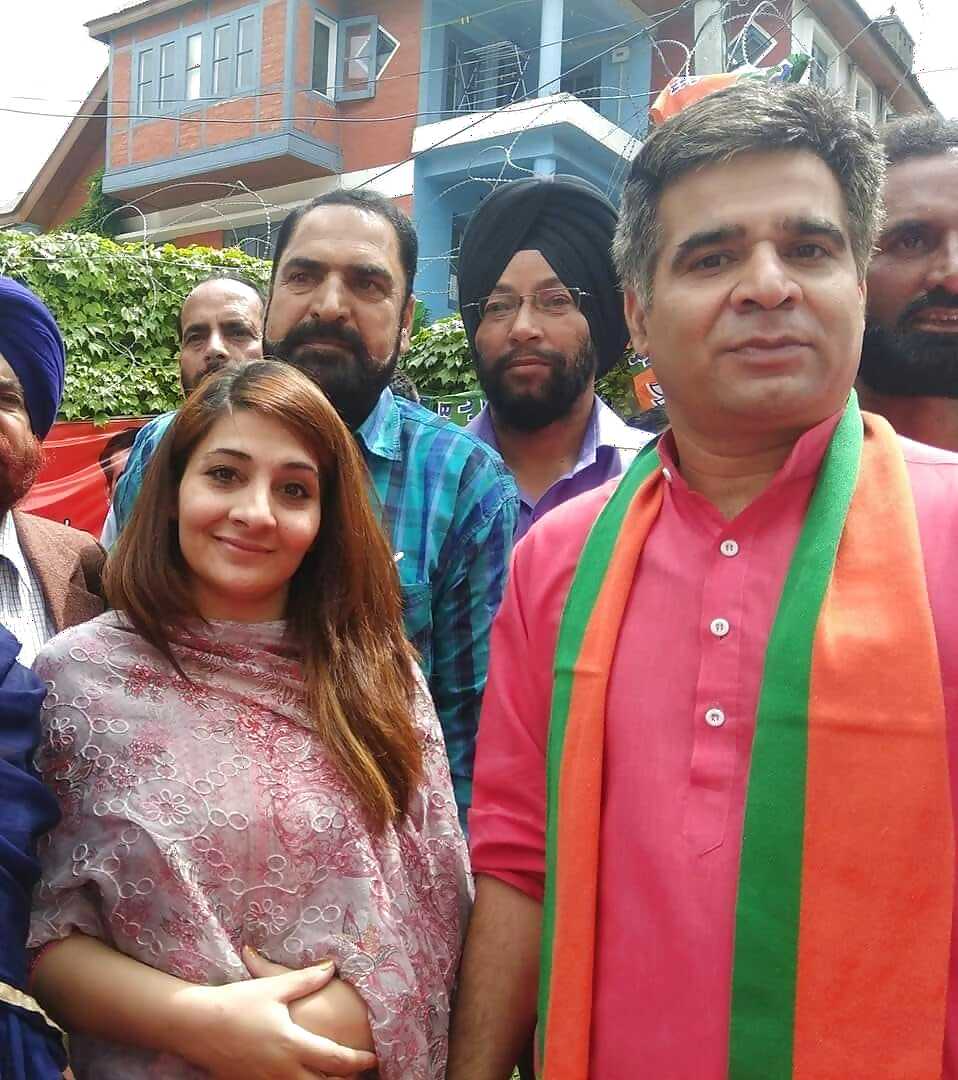
In 2014, BJP leader Neelam Gash became the first Shia Muslim woman in India to contest elections.
It was in 2014 when her political acumen caught the attention of a local BJP leader and she was offered a party ticket for the Assembly elections that followed. “I always wanted to join politics but the offer for me was a surprise.
It was for the first time that I came to know that the BJP existed in Kashmir,” Gash tells News18 in BJP’s Srinagar office.
It didn’t take her much time to finalise her decision. “I consulted my family. My father gave me permission, but told me to be careful. So, I said yes,” she says.
Gash was asked to fight from Zadibal constituency in Srinagar, where she was born. She had a week for campaigning and lost, securing just 316 votes. But she points out that in the process she became the first Shia-Muslim woman in India to contest elections. “I am proud of it,” she says.
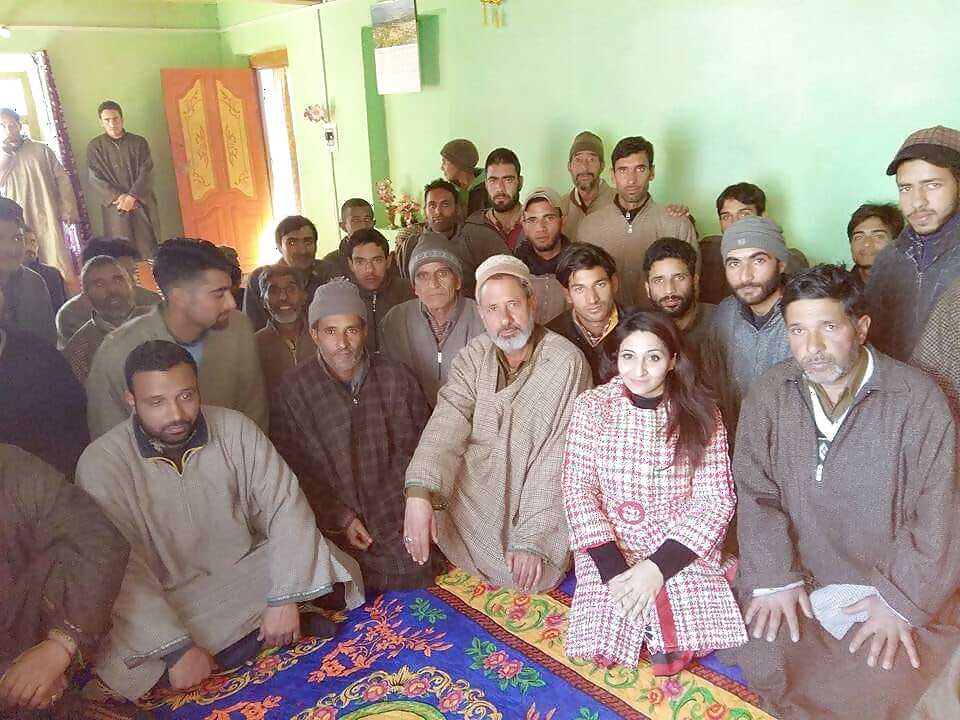
Neelam Gash is currently pursuing her second Master’s degree while working for the BJP.
“Whether it is Article 370 or something else, I agree with the party line,” she adds. “I have got enough respect from the party, found no gender bias either.”
Apart from Gash, two other women — Hina Bhat and Darakhshan Andrabi —contested elections on BJP ticket in Kashmir in 2014.
During her election campaign and after that, while working for the party, Gash says she has been asking women to join the BJP. “I am not looking for party workers but for the party leaders,” she says.
Gash added that she often faces abuse on social media. “But it doesn’t bother me as I am doing what I feel is right.”
She is currently pursuing her second Master’s degree while working for the party.
Javed Qadri
Shopian area of south Kashmir is considered to be one of the most volatile in the entire Valley. Scores of local youth from this area have joined militancy. This is a no-go zone for mainstream political leaders and even their prominent workers have fled south Kashmir, taking refuge in Srinagar and Jammu. And for good reasons. Several party workers have, in the past few months, been abducted and killed. The most recent was BJP leader from Pulwama, Shabir Ahmad, who was shot dead near his home on Eid-al-Adha.
However, 34-year-old Javed Qadri has stayed defiantly at home. A fruit businessman and former sarpanch, Qadri joined the BJP in 2014 and contested elections on the party ticket. He didn’t win, but secured around 3,700 votes, a BJP candidate has polled in any constituency in Kashmir.
“No one (among political leaders) is here. I don’t when the MLA last visited the area. So I am helping people,” says Qadri, sitting in his house in Mushvera village, 5 km from Shopian, surrounded by apple orchards.
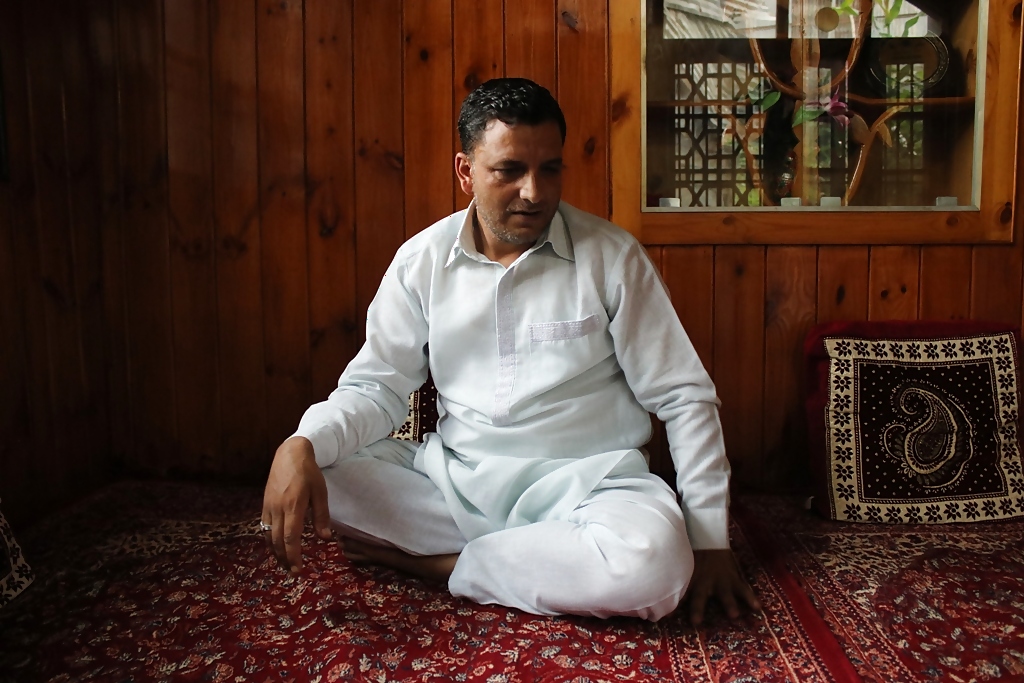
BJP’s Javed Qadri has refused to leave Shopian despite constant threat. (Photo by Abu Bakar)
“People from the village and surrounding areas visit me every day,” he says as few men visit him for help to sort out an issue with the police. “When local youth are arrested by the army or their mobile phones are snatched, I go and get them released,” says Qadri.
But he is working amid high security risk.
In November 2017, 30-year-old Gowhar Ahmad, Qadri’s colleague and BJP youth president of his district, was kidnapped from his home by militants. He was killed and his body, with the throat slit, was found a kilometre from his house. Undeterred, Qadri says he is preparing for panchayat elections and is confident that this time the party will show “extraordinary” results.
Father of two children, Qadri lives with his family in a house surrounded by 20-foot-high compound wall, barbed wires and police security. “I feel threatened and everyone advises that I should not stay here. But I have left it upon Allah. There is fear. I will not say I am not scared. But at the same time, I am proud of myself that I work for people. When I sleep, I know that I helped at least 10 people today. Allah will not wrong me.”
Qadri says he is the BJP’s ‘soldier’ and his party tells him to stay among the people. “If I am killed tomorrow, I will be remembered for my good work,” he says.
(The story is part of News18’s special series on BJP’s growing footprint in Kashmir)
(More Sunday Features)




















Comments
0 comment